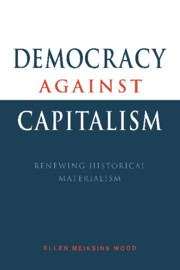Book contents
- Frontmatter
- Contents
- Acknowledgements
- Introduction
- I HISTORICAL MATERIALISM AND THE SPECIFICITY OF CAPITALISM
- II DEMOCRACY AGAINST CAPITALISM
- 6 Labour and democracy, ancient and modern
- 7 The demos versus ‘we, the people’: from ancient to modern conceptions of citizenship
- 8 Civil society and the politics of identity
- 9 Capitalism and human emancipation: race, gender and democracy
- Conclusion
- Index
8 - Civil society and the politics of identity
Published online by Cambridge University Press: 13 October 2009
- Frontmatter
- Contents
- Acknowledgements
- Introduction
- I HISTORICAL MATERIALISM AND THE SPECIFICITY OF CAPITALISM
- II DEMOCRACY AGAINST CAPITALISM
- 6 Labour and democracy, ancient and modern
- 7 The demos versus ‘we, the people’: from ancient to modern conceptions of citizenship
- 8 Civil society and the politics of identity
- 9 Capitalism and human emancipation: race, gender and democracy
- Conclusion
- Index
Summary
At a time when a critique of capitalism is more urgent than ever, the dominant theoretical trends on the left are busy conceptualizing away the very idea of capitalism. The ‘post-modern’ world, we are told, is a pastiche of fragments and ‘difference’. The systemic unity of capitalism, its ‘objective structures’ and totalizing imperatives, have given way (if they ever existed) to a bricolage of multiple social realities, a pluralistic structure so diverse and flexible that it can be rearranged by discursive construction. The traditional capitalist economy has been replaced by a ‘post-Fordist’ fragmentation, where every fragment opens up a space for emancipatory struggles. The constitutive class relations of capitalism represent only one personal ‘identity’ among many others, no longer ‘privileged’ by its historic centrality. And so on.
However diverse the methods of conceptually dissolving capitalism – including everything from the theory of post-Fordism to post-modern ‘cultural studies’ and the ‘politics of identity’ – they often share one especially serviceable concept: ‘civil society’. After a long and somewhat tortuous history, after a series of milestones in the works of Hegel, Marx and Gramsci, this versatile idea has become an all-purpose catchword for the left, embracing a wide range of emancipatory aspirations, as well – it must be said – as a whole set of excuses for political retreat. However constructive this idea may be in defending human liberties against state oppression, or in marking out a terrain of social practices, institutions and relations neglected by the ‘old’ Marxist left, ‘civil society’ is now in danger of becoming an alibi for capitalism.
- Type
- Chapter
- Information
- Democracy against CapitalismRenewing Historical Materialism, pp. 238 - 263Publisher: Cambridge University PressPrint publication year: 1995
- 2
- Cited by



